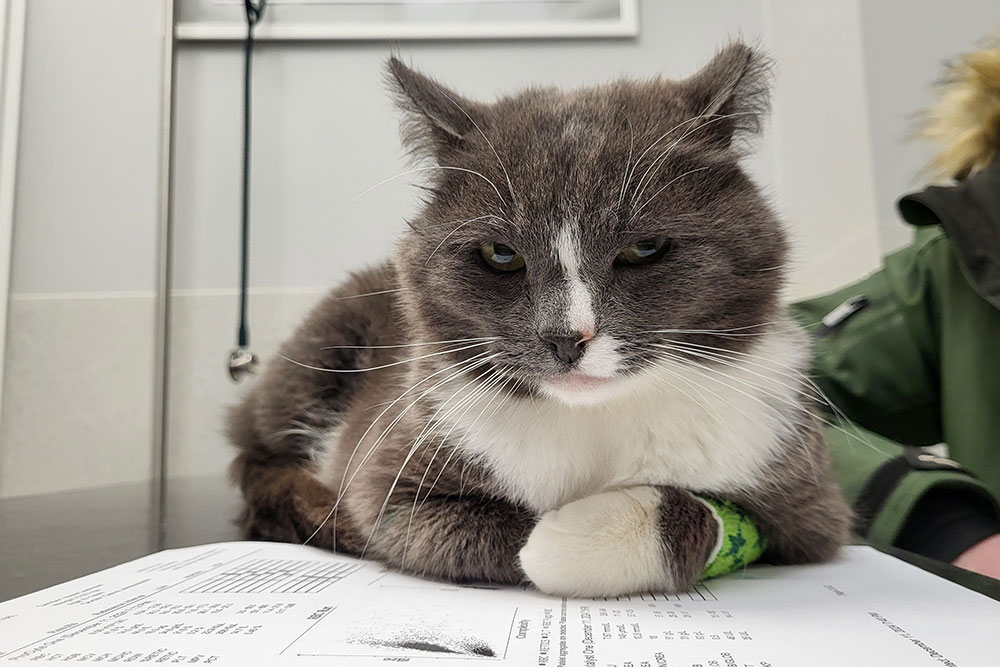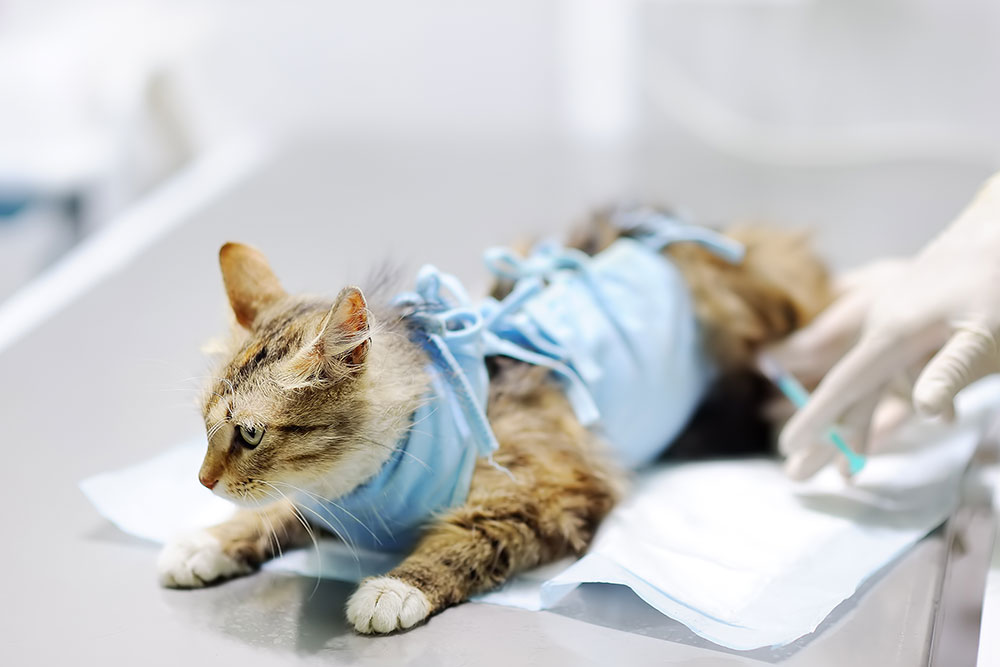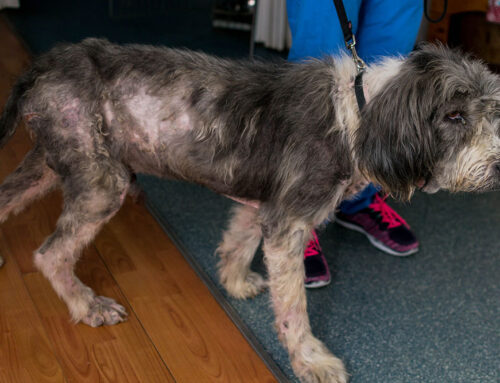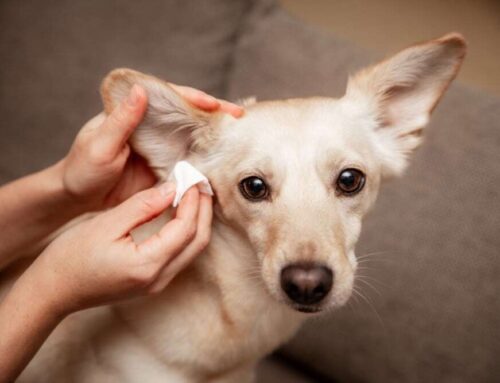Caring for Senior Cats: Recognizing the Subtle Signs of Illness
Cats are masters at hiding pain and discomfort, which makes detecting disease in their senior years challenging. Gradual weight loss, increased thirst, or changes in grooming may all point to common age-related conditions such as kidney disease, hyperthyroidism, or arthritis. Staying alert to these subtle shifts helps ensure early intervention and a better quality of life.
At Creature Comforts Veterinary Service, our AAHA-accredited practice provides comprehensive wellness and preventative care for senior cats, combining advanced diagnostics with compassionate expertise to help aging felines thrive.
Understanding Age-Related Health Conditions in Senior Cats
As cats enter their senior years, typically around age seven to ten, their bodies become more susceptible to specific health conditions. Recognizing these changes early and managing them proactively can dramatically improve your cat’s comfort and longevity.
Arthritis: The Silent Mobility Thief
Many cat owners assume their pet is simply “slowing down” with age, but arthritis affects up to 90% of cats over twelve years old. Unlike dogs, cats rarely limp. Instead, they adapt their behavior in subtle ways that owners might miss.
Watch for these signs:
- Hesitation before jumping onto furniture or window perches
- Using alternative routes to avoid stairs
- Reduced grooming, particularly around the hindquarters and tail base
- Litter box accidents or reluctance to enter high-sided boxes
- Increased sleeping and decreased play behavior
Maintaining a healthy weight is critical for managing arthritis in cats, as excess pounds place additional stress on already painful joints. Nutritional supplements such as glucosamine, chondroitin, and omega-3 fatty acids can support joint health and reduce inflammation. Our alternative medicine services offer additional pain management options that work alongside traditional treatments to keep senior cats comfortable and mobile.
Chronic Kidney Disease: A Common Senior Cat Challenge
Chronic kidney disease (CKD) affects approximately one in three senior cats. The kidneys gradually lose their ability to filter waste products from the bloodstream, leading to a buildup of toxins that affects multiple body systems.
Early warning signs include increased water consumption, more frequent urination, weight loss despite normal appetite, lethargy, and poor coat quality. Some cats also develop nausea, vomiting, or bad breath as the disease progresses.
Management focuses on slowing disease progression and maintaining quality of life. Therapeutic renal diets reduce the kidneys’ workload by limiting protein, phosphorus, and sodium while providing high-quality calories. Many cats benefit from regular subcutaneous fluid therapy, which helps flush toxins and maintains hydration.
Regular monitoring through diagnostic testing allows veterinarians to track kidney function and adjust treatment as needed. Blood work and urinalysis provide valuable information about how well the kidneys are filtering waste and whether additional interventions are necessary.
Hyperthyroidism: When the Metabolism Goes Into Overdrive
Hyperthyroidism occurs when the thyroid gland produces excessive amounts of thyroid hormone, dramatically increasing the body’s metabolic rate. This condition is extremely common in senior cats and can lead to serious complications if left untreated.
Affected cats often show increased appetite paired with progressive weight loss. They may become more vocal, restless, or irritable. Some develop vomiting or diarrhea, while others show increased thirst and urination. Without treatment, hyperthyroidism in cats can cause high blood pressure, heart disease, and kidney damage.
Treatment options include daily oral medications that suppress thyroid hormone production, prescription low-iodine diets that limit the raw materials needed for hormone synthesis, or radioactive iodine therapy that destroys overactive thyroid tissue. Regular monitoring of thyroid hormone levels and blood pressure ensures treatment remains effective and complications are caught early.
Cognitive Decline and Behavioral Changes in Aging Cats
Senior cats can experience cognitive dysfunction similar to dementia in humans. This condition affects memory, awareness, and learned behaviors, leading to noticeable personality and habit changes.
Symptoms may include increased vocalization, especially at night, altered sleep-wake cycles with nighttime restlessness, confusion or disorientation in familiar spaces, reduced interaction with family members, and house soiling despite previously reliable litter box habits.
Management strategies focus on environmental enrichment and nutritional support. Puzzle feeders, interactive toys, and regular play sessions provide mental stimulation. Antioxidant-rich diets and supplements containing omega-3 fatty acids may support brain health and slow cognitive decline.
Dental Disease: More Than Just Bad Breath
Oral health problems affect the majority of senior cats and can cause significant pain while contributing to systemic disease. Bacteria from infected gums enter the bloodstream and can damage the heart, kidneys, and liver.
Professional dental cleanings under anesthesia allow veterinarians to thoroughly examine the mouth, remove calculus below the gum line, and address diseased teeth. Home care, including dental diets and tooth brushing, helps maintain oral health between professional cleanings.
Complementary Therapies for Enhanced Senior Cat Comfort
Combining conventional veterinary medicine with complementary therapies can significantly improve senior cats’ comfort and activity levels. These integrative approaches work alongside traditional treatments to address pain, inflammation, and reduced mobility. Our alternative medicine services provide these integrative options as part of comprehensive senior cat care.
Acupuncture for Chronic Pain Management
Acupuncture for pets involves placing thin needles at specific points along the body to stimulate healing and pain relief. This ancient practice improves circulation, releases natural pain-relieving compounds, and reduces inflammation in arthritic joints.
Many senior cats tolerate acupuncture well, often relaxing or sleeping during treatments. Sessions typically last 15 to 30 minutes and may be recommended weekly or monthly depending on the condition being treated.
Laser Therapy for Inflammation and Healing
Laser therapy for pets uses focused light energy to penetrate tissues, reducing inflammation and accelerating healing at the cellular level. This non-invasive treatment is particularly effective for arthritis, soft tissue injuries, and post-surgical recovery.
Cats typically find laser therapy comfortable and non-threatening. The treatment wand is moved slowly over affected areas while the pet rests quietly. Most cats require multiple sessions for optimal results, with treatments spaced several days apart initially and then maintained monthly or as needed.
Massage Therapy for Muscle Tension and Circulation
Gentle feline massage techniques can ease muscle tension, improve circulation, and strengthen the bond between cats and their owners. Massage helps maintain flexibility in aging joints and provides sensory stimulation that benefits cats with cognitive decline.
Owners can learn basic massage techniques to perform at home, making this therapy both accessible and cost-effective. Professional animal massage therapists can also provide more advanced treatments for cats with specific musculoskeletal issues.
Creating a Senior-Friendly Home Environment
Simple modifications to your home can dramatically improve your senior cat’s daily comfort and independence. These changes accommodate reduced mobility, sensory changes, and cognitive decline.
Provide ramps or pet stairs to favorite resting spots, allowing cats to access beds, sofas, and window perches without painful jumps. Low-sided litter boxes with wide entrances make elimination easier for cats with arthritis. Place multiple litter boxes on each floor of multi-level homes to reduce the distance cats must travel. Orthopedic beds with memory foam support aching joints and provide warmth that soothes arthritis pain. Place beds in quiet, easily accessible locations away from household traffic.
Ensure food and water bowls are easily accessible and consider raising them slightly to reduce neck strain. Some senior cats benefit from increased feeding frequency with smaller meals to accommodate reduced stomach capacity and changing metabolic needs.

Partnering With Your Veterinarian for Optimal Senior Cat Care
Early detection and proactive management transform age-related conditions from life-limiting diseases into manageable chronic conditions. Regular veterinary examinations with blood and urine testing, ideally twice yearly for senior cats, allow veterinarians to identify subtle changes before they become serious problems.
Our team at Creature Comforts Veterinary Service provides comprehensive care for senior cats, from routine wellness visits to 24/7 emergency services when urgent concerns arise. Our advanced diagnostic capabilities and commitment to individualized care ensure your senior cat receives the attention they deserve.
When you notice changes in your cat’s behavior, appetite, or activity level, don’t wait. Request an appointment or contact our team to discuss your senior cat’s specific needs. Together, we can create a care plan that maximizes comfort, maintains quality of life, and helps your cat enjoy their golden years to the fullest.





Leave A Comment